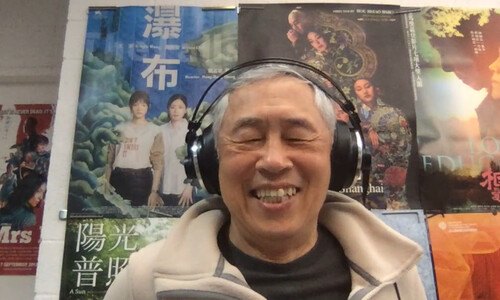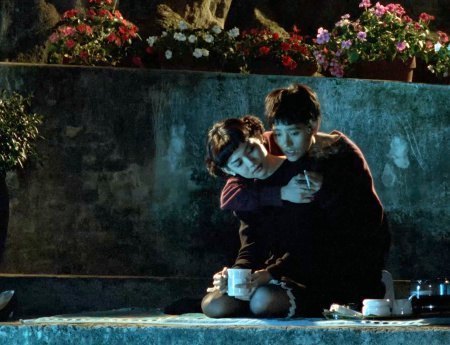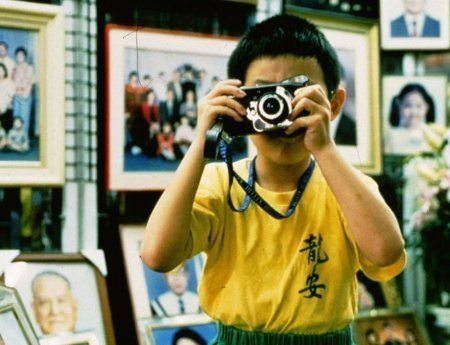I raz, i dwa
Przygotuj sprzęt i wciśnij play by uruchomić doświadczenie
Pokazy w kinie
Muranów
Kinoteka 1
Dostępność online
Materiały dodatkowe
Opis filmu
Obraz codzienności przeciętnej rodziny z klasy średniej Tajpej ujęty w klamrę dwóch uroczystości: ślubu i pogrzebu. Ojciec, NJ, boryka się z problemami w pracy i próbuje podpisać kontrakt ze znaną japońską firmą produkującą gry wideo. Nastoletnia Ting Ting uczęszcza do jednego z najlepszych liceów w Tajpej, zaś kilkuletni syn Yang Yang próbuje poradzić sobie z bezsensowną agresją, której doświadcza w szkole ze strony rówieśników i nauczycieli. Gdy ukochana babcia ma wypadek i zapada w śpiączkę, rodzina mierzy się ze śmiercią, której obecność była do tej pory niewidoczna.
Dla Edwarda Yanga ideałem było kino, które oferuje doświadczenie najbardziej zbliżone do życia. I raz, i dwa w pełni realizuje ten zamysł. Reżyser tworzy całe uniwersum utkane z momentów i gestów, emocji i przeczuć, małych decyzji, które okazują się przełomowymi wyborami życiowymi. Pozornie proste pytania prowadzą do długich rozmów o przewrotnej treści. W swoim ostatnim filmie Edward Yang zawarł refleksje nad samym medium filmowym i zawodową misją filmowca. Fotografia i film są szansą na pokazanie niewidocznego, uświadomienie sobie wielości punktów widzenia, niepowtarzalną okazją do nawiązania dialogu. W I raz, i dwa wychodzi widzowi naprzeciw i wita go w swoim świecie po raz ostatni.
tekst:
Maja Korbecka
Edward Yang
Urodził się w 1947 roku w Szanghaju. Jego ojciec pochodził z południowej prowincji Guangdong, a matka z Hebei na północy Chin. Oboje wywodzili się ze zubożałych rodzin inteligenckich, w Szanghaju wykonywali pracę biurową w strukturach rządu nacjonalistycznego. Dwa lata po narodzinach Yanga, cała rodzina przeniosła się do Tajpej w związku z przejęciem władzy w Chinach przez partię komunistyczną. Pomimo fascynacji architekturą i filmem, Edward Yang wybrał studia inżynieryjne. Po ich ukończeniu wyjechał do Stanów Zjednoczonych, by nadal kształcić się w kierunku komputerowego designu. Po siedmiu latach pracy w Seattle jako programista zdecydował się wrócić na Tajwan i rozpocząć karierę filmową. Po ukończeniu filmu krótkometrażowego Oczekiwanie, w ramach nowelowej produkcji W naszych czasach inicjującej Tajwańską Nową Falę, Yang zadebiutował w 1983 roku niespełna 3-godzinnym filmem Tego dnia na plaży. W ciągu swojej prawie 30-letniej kariery, Edward Yang tworzył różnorodne filmy. Jego trzeci film, postmodernistyczna tragikomedia Terroryści, odniósł sukces kasowy i zyskał uznanie krytyki. Film zdobył Srebrnego Lamparta na MFF w Locarno w 1987 roku i nagrodę dla najlepszego filmu podczas Golden Horse Film Awards. Kolejne filmy Yanga – wielokrotnie nagrodzony na festiwalach epicki obraz rzeczywistości Tajpej lat 60-tych Jasny dzień lata, komediowa Konfucjańska konsternacja i gangsterski Madżong – okazały się klęskami finansowymi. Zrealizowany w koprodukcji z Japonią ostatni film Edwarda Yanga, I raz, i dwa, przyniósł mu nagrodę za najlepszą reżyserię na festiwalu filmowym w Cannes w 2000 roku. Po wygranej w Cannes reżyser rozpoczął pracę nad wieloma projektami: animacją Wiatr, stroną internetową z autorskimi komiksami Miluku.com, czy scenariuszem do adaptacji Ostrożnie, pożądanie, jednak żaden z nich nie został ukończony. Edward Yang zmarł w 2007 roku w Kalifornii na raka okrężnicy.
1982 W naszym czasie / Guangyin de gushi / In Our Time (segment Oczekiwanie / Zhiwang / Expectation)
1983 Tego dnia na plaży / Haitan de yi tian / That Day, on the Beach
1985 Historia z Tajpej / Qingmei zhuma / Taipei Story
1986 Terroryści / Kongbu fenzi / Terrorizers
1991 Jasny dzień lata / Gulingjie shaonian sharen shijian / A Brighter Summer Day
1994 Konfucjańska konsternacja / Duli shidai / A Confucian Confusion
2000 I raz, i dwa / Yi Yi / A One and a Two








